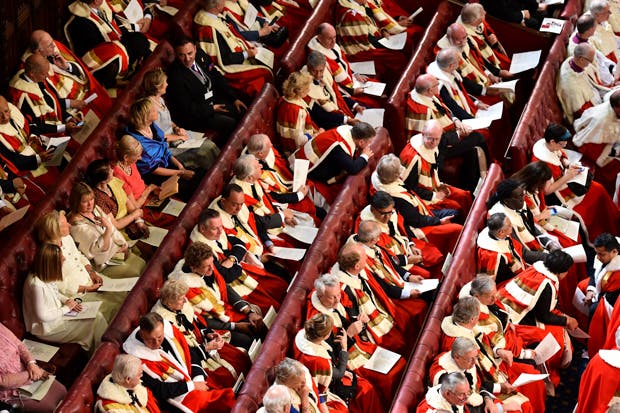The shaming of Lord Sewel was a classic tabloid exposé. The fact that a peer of the realm (albeit one appointed by Tony Blair) was caught on camera apparently ingesting Class A drugs in the company of prostitutes is a good enough story in itself. The fact that the peer in question was chairman of the Lords privileges and conduct committee while he was doing so makes it very near to red-top nirvana. Since the publication of the story — and scores of lavish accompanying photographs — the peer’s Pimlico flat has been raided by police (who battered down a door to gain access), and Lord Sewel has resigned from the House of Lords, expressing the correct and noble sentiment that he can ‘best serve the House by leaving it’.
Ordinarily that would have been that. But nothing involving the issue of the House of Lords is ever ordinary. The composition, character and powers of the Upper House remain a low-level but significant sore in British politics. On the day of Lord Sewel’s resignation, the new Liberal Democrat leader, Tim Farron, attempted to win political points from the affair and to stoke any popular resentment against the House by declaring that the Lord Sewel story was not just about ‘one bad apple’. On the contrary, according to Mr Farron, the Sewel affair revealed a system which was ‘rotten to the core’. The argument would be easier to take if senior Liberal Democrats were not currently engaged in an effort to squeeze as many recently jobless representatives of their own party as possible through the House of Lords’s doors. Nevertheless, even if this were not the case, Mr Farron would still be wrong.
It seems unlikely that any very significant number of peers engage in the same relaxations and pastimes as Lord Sewel. Yes, the oddities and inconsistencies which can be pointed to in the House of Lords are significant in number. As this magazine has said before, the whole system by which this country appoints the second chamber is far from ideal. If you were to start a new Parliamentary system from scratch, you would be unlikely to put together a revising chamber which was partly hereditary, partly clerical, and significantly party donation-related. But we are not starting from scratch and are unlikely ever to be.
Besides, many of the oddities of the House are precisely its strengths. The diversity of backgrounds, interests and attitudes in the Upper House puts our increasingly identikit Lower House to shame. When those from the political left criticise the preponderance of conservative interests in the Lords, they should spend more time studying the details.
The House of Lords is today acting as a significant brake on parts of the elected government’s agenda. On welfare reform, for instance, the Lords have often challenged the government’s attempts to save money. Members of the Lords regularly make genuine and substantial contributions to the passing of bills. Thanks in part to their experience of the world outside Westminster politics, they often pick up things which MPs miss.It was members of the Lords who recently identified some unforeseen and potentially disastrous consequences in the government’s Childcare Bill. This led to a partial climbdown by the government. Having been berated for what peers called a ‘particularly egregious example’ of ‘vaguely worded legislation that leaves much to the discretion of ministers’, ministers have promised more solid details before the bill is returned for their inspection in the autumn. Such useful oversight goes on every day in the Lords, though it is often little noted outside the world of Westminster.
The House suffers from problems that the government could do with addressing, not least the matter of what might impolitely be termed ‘dead wood’. This is not to speak of the eldest members, but of those who do not contribute or have little to contribute after a brief party political rise. As the frequent scandals of expense-claiming Lords prove, there are certainly members who appear to use the House simply to survive off the House. It remains a scandal that such figures as Baroness Uddin — briefly suspended for a sizeable fraud — should simply be allowed to return to the House after a period of suspension. Then there are the 124 members of the House of Lords who live in London, yet claim up to £300 a day for travel to the House and accommodation. Baroness Wilcox has billed the taxpayer as much as £5,700 a month for the 200-yard walk between her home in Westminster and the House. They have brought the House into more disrepute (albeit less colourfully) than Lord Sewel.
Currently on a trade mission in the Far East, the Prime Minister has responded to this week’s scandal by saying that he regrets not addressing the issue of the unelected Lords in his first term. Yet the fallout from this soon-to-be-forgotten scoop shows an imperfect system working relatively well. A man was caught doing something he oughtn’t to have been doing and has removed himself from public office. There may be any number of good arguments on which to base further reform of the House of Lords — but the case of Lord Sewel is not among them.
Got something to add? Join the discussion and comment below.
Get 10 issues for just $10
Subscribe to The Spectator Australia today for the next 10 magazine issues, plus full online access, for just $10.














Comments
Don't miss out
Join the conversation with other Spectator Australia readers. Subscribe to leave a comment.
SUBSCRIBEAlready a subscriber? Log in